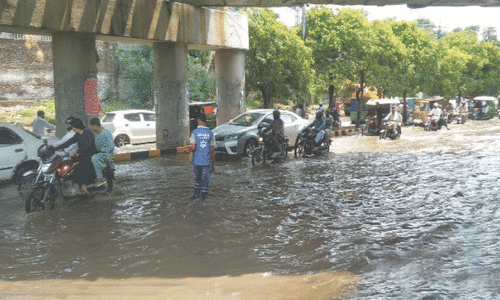
“THIS is not a novel to be thrown aside lightly. It should be thrown with great force,” wrote Dorothy Parker, the famous American humorist, poet and critic, in one of her book reviews.
We may not have the same feeling about poetry collections as Parker had about that particular novel, yet some of the collections by some new poets of Urdu may invoke almost an irresistible impulse to do what she suggested: throw them away with great force. But not all new poetry is bad and the real problem is: our society has become somewhat indifferent to poetry.
The situation is summed up by Yasmeen Hameed in one of her articles, lamenting disconnect between poetry and Pakistani society. In fact, an interesting debate on poetry and its status in our society has ensued with publication of that article by Yasmeen Hameed in a recent issue of Mukalma, an Urdu literary magazine edited by Mubeen Mirza and published from Karachi.
But before we mourn the communication gap between readers and today’s poets of Urdu, let us have a look at how poetry is doing in western societies known for the love of reading. ‘Poetry is going extinct’, read part of the title of an article by Christopher Ingraham, published some eight years ago in The Washington Post.
While he asked the question ‘does anyone read poetry anymore’, Ingraham challenged a claim made by some poetry buffs that given the widespread availability of poetry on the internet, more people were reading poetry than ever.
Ingraham wrote that data showed that though some people still read poetry, the number of readers of poetry had been falling steadily over a couple of decades in the United States. The data collected in 2012 showed, according to Ingraham, in 1992, about 17 per cent of Americans had read a work of poetry at least once in the previous year. But in 2012, the number had fallen by more than half, to 6.7pc, as revealed by Survey of Public Participation in the Arts (SPPA). Result: fewer American people were reading poetry than ever.
We in Pakistan do not have such surveys nor do we, sorry to say, care much about notions discussing public participation in the arts. But during the last few decades we have witnessed a flurry of poetry collections that poets self-published and practically nobody bought them. Such amateurish collections of many ‘poetic geniuses’ are usually handed out as gifts and are rarely read, if ever.
Of course, books by established and popular poets do sell well, albeit in Urdu publishing ‘selling well’ means a few thousand copies that are sold over a span of a few years. Despite the fact that a popular book may be sold in millions in the West, these days poetry does not sell in the West either and, as put by Ingraham in the above-cited article, poetry is “a field where a book with four-digit sale can be considered a success”. So, we do not have much to complain about.
Ms Hameed, a poet and critic in her own right, in her article titled ‘Urdu Shaeri Ka Maujooda Manzar Nama’ (the state of affairs of present-day Urdu poetry), succinctly wrote that our poetry was passing through a crisis as the readers (whom she has termed ‘receivers’) are not connected to what is being written. She has drawn four circles: in the first and narrowest circle are poets seriously writing poetry. They are sufficient in number but do not recognise or accept each other. In the second circle, slightly larger, there are some junior but popular poets. Even larger is the third circle that comprises of senior popular poets. The last and the largest circle is the one that she has named readers or “receivers”.
One of the problems of today’s Urdu poetry is that, as put by Ms Hameed, reader recognises only the popular poets that are included in the second and third circles and this recognition, too, is very shallow and superficial, effectively ignoring the poetry of the senior and serious poets. She thinks this is a very confusing situation and one of the reasons is that the reader of poetry had not been properly trained during the last 60 years or so to understand delicacies of poetry. Such readers may log on to a YouTube channel and might know the names of a few popular poets. But there is much more to poetry than popular poetry available on social media.
Some writers have expressed their views on Ms Hameed’s article. These views are included in issue No. 61 of Mukalma. Those who have expressed their views are: Aslam Ansari, Najeeba Arif, Ayaz Mahmood and Rukhsana Saba. This has added much food for thought to the debate and serious readers must relish it.
Published in Dawn, November 28th, 2022












































Dear visitor, the comments section is undergoing an overhaul and will return soon.